The nation’s oil and gas industry is emitting nearly 60 percent more methane than the official estimates of the Environmental Protection Agency, according to a new study.
The findings, published in the journal Science, represent the “best estimate to date” of the environmental impact of the U.S. oil and gas industry, according to co-author Jeff Peischl, a scientist at the National Oceanic and Atmospheric Administration’s Earth System Research Laboratory, in Boulder, Colorado. The study was led by researchers at the Environmental Defense Fund, with support from 19 co-authors.
Methane, the main ingredient in natural gas, is 80 times more potent than carbon dioxide as a heat-trapping gas over a 20-year period. It is emitted during the production and transport of coal, natural gas and oil. Study authors attribute the majority of these emissions to leaks, equipment malfunctions and operator errors. Researchers estimate the leak rate to be 2.3 percent, versus the current EPA estimate of 1.4 percent.
“Although the percentages seem small, the volume represents enough natural gas to fuel 10 million homes — lost gas worth an estimated $2 billion,” the EDF said in a statement that accompanied the study.
Collectively, the oil and gas sector emits 13 million metric tons of methane per year, according to the study.
